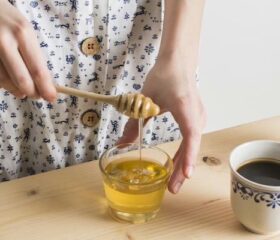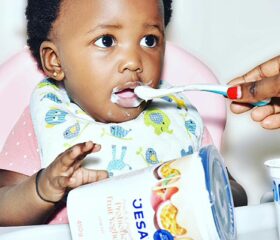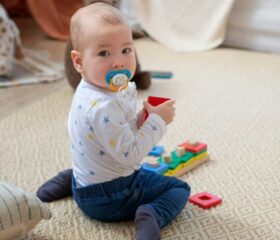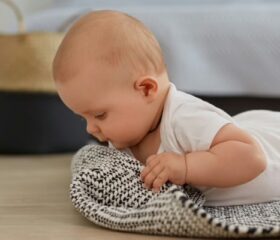Why Can’t Babies Have Honey at First (And When Can They Have It)?
Sweet, golden, and natural—honey seems like it’d be the perfect addition to your baby's diet, right? Think again.
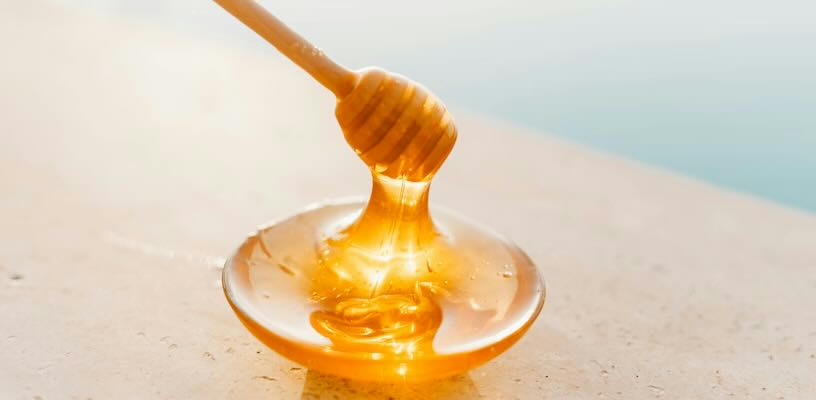
Although honey has plenty of benefits for adults, small babies can’t handle it just yet, and it can actually be dangerous for them.
Let’s dive into why honey should wait and explore some sweet (and safe) alternatives that are perfect for your baby’s first bites.
Why can’t newborn babies have honey?
Babies can’t have honey until they’re at least a year old. The main reason is that babies are more prone to a dangerous form of food poisoning known as botulism, caused by the bacteria Clostridium botulinum.
Honey can contain spores of this bacteria. These are harmless to older children and adults whose digestive systems have fully developed, but dangerous to very young infants. 1 2
What are the symptoms of botulism?
In cases of food-borne botulism, some symptoms may show up within 12–48 hours of eating the contaminated food. However, the signs of infant botulism usually appear at any point between 3 and 30 days. 3
- Weak cry
- Blurred or double vision (though this can be hard to spot in a baby)
- Constipation
- Dry mouth
- Drooping eyelids
- Difficulty feeding, swallowing or vocalizing
- Reduced gag reflex
Contact your pediatrician straight away if you notice any of these symptoms or are concerned that your baby accidentally ate honey.
How infant botulism progresses
As mentioned, your baby’s symptoms may show up relatively quickly after she’s exposed to the spores.
You might notice that she seems a little “floppy” as she becomes weak and loses muscle tone. This muscle weakness occurs in a descending fashion, and will start in her head and face and move to her upper arms, lower arms, thighs, calves, and then her feet.
Without medical help, she may develop paralysis in these areas, as well as in her respiratory system. She may need help breathing through a ventilator for a few weeks. If she’s having trouble swallowing or eating, she may also need to get her nutrition through an IV line. 5
Fortunately, infant botulism is rare, with about 100 cases every year in the US. Raw honey accounts for around 20% of these cases. 6
Can you prevent infant botulism from honey?
The only way to prevent your baby from getting infant botulism from honey is to avoid it completely until she’s at least 12 months old.
Unfortunately, even cooking or pasteurizing honey doesn’t completely eliminate the risk of botulism. The spores are heat-resistant and aren’t easily destroyed by normal cooking processes. 7 You should avoid any products containing honey, like honey pacifiers, graham crackers, or flavored cereals, during her first year.
However, you can still eat honey while breastfeeding. The toxin can’t pass through your body into your breast milk, so you can safely enjoy this treat as long as you keep it out of your baby’s reach. 8
How should you introduce your baby to honey?
Once your baby turns one year old, her digestive system will be mature enough to handle the spores in honey. Introduce it just like any other new food—in moderation.
Start with a small amount of honey to see how she reacts first. If she likes it, you can offer it to her as often as her pediatrician recommends.
You can try spicing up her mealtime by adding a small drizzle of honey to her toast, oatmeal, or yogurt (babies can have pasteurized yogurt as soon as they start eating solid foods, but avoid all unpasteurized dairy).
If your baby gets sick, honey can also be a natural way to suppress coughs and soothe her throat. 9
Can babies be allergic to honey?
While it’s rare, babies can be allergic to honey. When your baby tries honey (or any new food, for that matter), watch out for signs of an allergic reaction, such as: 10
- Hives
- Itching
- Swelling
- Sneezing
- Vomiting
- Difficulty breathing
Call 911 immediately if you spot any of these symptoms.
What are good honey alternatives?
Honey is a form of added sugar, which you should limit in your baby’s diet.
When you first introduce solid foods to your baby (when she’s around 6 months old), choose nutritious, naturally sweet alternatives, like mashed or pureed fruits and vegetables, instead of foods containing added sugars.
You can give your baby: 11
- Apples
- Bananas
- Blueberries
- Carrots
- Pears
- Mango
- Melon
- Sweet potatoes
Remember to carefully remove any seeds, pits, or pulp to avoid choking. As mentioned, you should always keep an eye out for an allergic reaction whenever you introduce your baby to new foods.
Avoid sugar until your baby is 2 years old
Generally, you shouldn’t give sugar to your baby until she’s at least two years old. Giving her sugar too early can increase her chances of obesity later in life, as well as put her at risk of high blood pressure, type 2 diabetes, and even tooth decay. 12 13
Final thoughts
Though you may be tempted to add a spoonful of honey to your baby’s oatmeal, cereal, or toast, you’ll have to wait until she’s at least a year old to give it to her. After that, she can enjoy honey in moderation. If you have any other questions about your baby’s diet, you can always chat with your pediatrician.
Article Sources
- Centers for Disease Control and Prevention. "Foods and Drinks to Avoid or Limit" Retrieved August 29, 2025.
- HealthyChildren.org. "Botulism" Retrieved August 29, 2025.
- Cleveland Clinic. "Botulism (Clostridium Botulinum)" Retrieved August 29, 2025.
- New York State Department of Health. "Botulism (food-borne botulism and infant botulism)" Retrieved August 29, 2025.
- Nemours KidsHealth. "Infant Botulism" Retrieved August 29, 2025.
- StatPearls. "Infantile Botulism" Retrieved August 29, 2025.
- Health Canada. "Infant botulism" Retrieved August 29, 2025.
- Infant Botulism Treatment and Prevention Program. "Frequently Asked Questions (FAQs) about Infant Botulism" Retrieved August 29, 2025.
- Mayo Clinic. "Is it true that honey calms coughs better than cough medicine do?" Retrieved August 29, 2025.
- MedicalNewsToday. "What is a honey allergy?" Retrieved August 29, 2025.
- National Health Service. "From around 6 months" Retrieved August 29, 2025.
- Cleveland Clinic. "Sugar: How Bad Are Sweets for Your Kids?" Retrieved August 29, 2025.
- National Health Service. "Foods to avoid giving babies and young children" Retrieved August 29, 2025.
